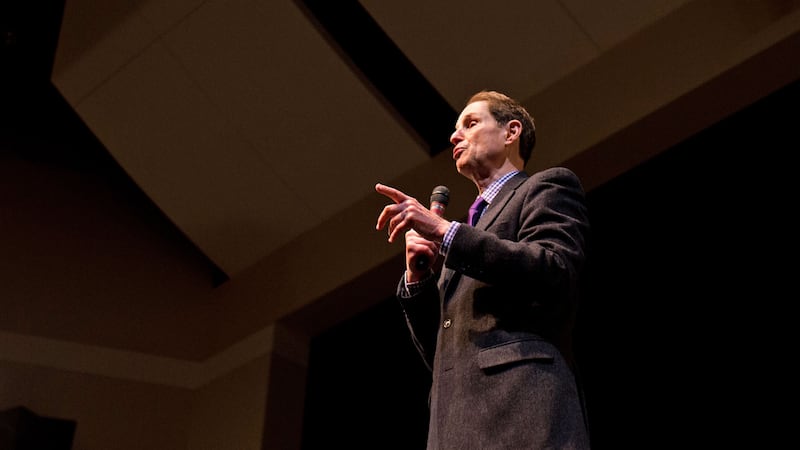Like most Americans, Sen. Ron Wyden is never far from a cellphone. But for Oregonians—and laid-off workers in every state—the calculator on Wyden's iPhone proved to be a godsend.
Here's an explanation from the Washington Post of how Wyden's phone helped settle a disagreement with Treasury Secretary Steve Mnuchin over the cost of extending unemployment benefits for four extra months rather than three.
"When the impasse emerged, Sen. Ron Wyden (D-Ore.), the ranking Democrat on the Senate Finance Committee, used the calculator feature on his iPhone to show Mnuchin what a fourth month of unemployment insurance benefits would cost," the Post reported. "Mnuchin listened and then agreed, locking in a major expansion of jobless benefits that would incense several Senate Republicans but give Democrats a key reason to support the agreement."
After negotiations concluded, Wyden and his colleagues agreed on a 13-week extension, to 39 weeks, of unemployment benefits; an increase of $600 a week in the benefit many laid-off workers can get; coverage for gig-economy workers and contractors not historically eligible for unemployment insurance; an expansion of the program that subsidizes employees at companies that might otherwise lay them off; money for new loans to small and mid-sized businesses; and a six-month grace period for companies with existing loans from the Small Business Administration. Individuals making less than $75,000 will get checks of $1,200. The package also includes funding for hospitals, transit and schools and a $150 billion Coronavirus Relief Fund.
Wyden's office calculates the package could bring as much as $3.3 billion in relief to Oregonians. WW caught up with Wyden for a brief interview after the package passed the House earlier today. (President Donald Trump has already signed it into law.) Wyden's responses have been edited for clarity and brevity.
WW: What part of the bailout do you think is most significant for Oregonians?
Sen. Ron Wyden: The way I looked at is this: There are two sides to the same coin. The first part is protecting workers and replacing lost wages. They've been hit by a wrecking ball. The second is trying to make sure that small businesses, which are the backbone of Oregon's economy, can survive.
How soon will the bailout money get to Oregon?
With some of the SBA loans, it will be almost immediate. Unemployment money may take longer. Nationally, there are almost 3 million new unemployment claims. Offices are just flooded with them. Unemployment is handled at the state level, but I was able to get more money for staffing the state offices.
What did you ask for in the package that you didn't get?
Well, I was really glad we did get that fourth month. But there are some really big needs left. FMAP—that's the federal share of the Medicaid program. A lot of people don't know this, but most nursing home care is paid for by Medicaid. We need more money for that. I am also still very concerned about pharmaceutical price gouging. We didn't address that.
You've served in Washington though several crises. How is this one different?
In my time in public service, I have never seen anything that has developed over a matter of weeks and produced the kind of fear and anxiety that we are seeing right now. That's the reason I felt so strongly about the package for individuals and small businesses. This is very different from the Great Recession that started in 2008 because it's driven by a disease that came upon us suddenly.
Gov. Kate Brown has complained that the feds have been very slow to supply the personal protective equipment Oregon health care workers need. Any insight?
It's 3,000 miles from Portland to Washington, D.C. For a lot of folks in D.C., we might as well be on Mars. I've always tried to [bridge] that distance. I was on the phone with the administrator of FEMA this morning because somehow our request for ventilators got lost. I got it worked out and got a call later saying the ventilators are now in Wilsonville.
It doesn't help that in the Trump administration there are so many vacant positions. And I am really convinced that his closing down the office that was supposed to prepare for pandemics is part of the problem. The president basically disarmed us by closing off that work. And the fact he's downplayed the virus so much is also part of the problem.
You've been a persistent critic of the president. Anything positive to say about him now there's this $2 trillion relief package?
I'm sure glad that the president described this whole effort to block the package [by U.S. Rep. Thomas Massie (R-Ky.)] as a big grandstanding operation.
